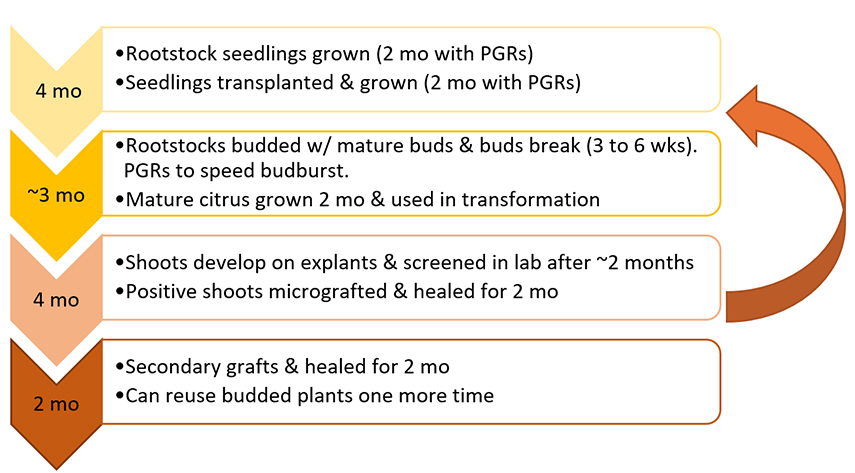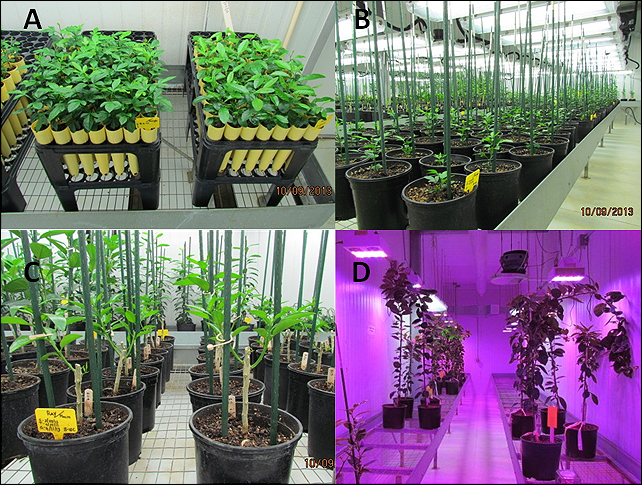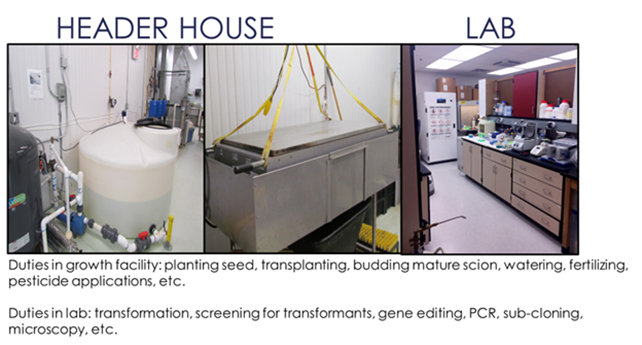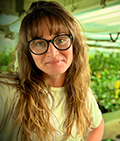The University of Florida, Institute of Food and Agricultural Science (UF/IFAS) and the Citrus Research and Development Foundation (CRDF) established The Mature Citrus Facility (MCF) at the Citrus Research and Education Center (CREC) in Lake Alfred, FL and it started receiving orders for transgenics in 2014. This is a fee-for-service plant production facility for scientists, growers, and industry. Targets include tolerance or resistance to citrus greening or Huanglongbing (HLB), canker and other value-added traits. Mature citrus will flower and fruit earlier than immature citrus, enabling examination of these traits in genetically altered plants.
Mission and goal: Our mission is to accelerate solutions for pests and diseases threatening the Florida citrus industry. Our goal is to produce mature transgenic, cis/intragenic or edited citrus, containing desirable traits for research, testing, and potential commercialization.
Procedures and Services: We routinely use Dr. Leandro Pena’s Agrobacterium based protocol for transformations and gene-editing, but we can also produce cis/intragenics using our own biolistic transformation protocol, free of plant pest sequences, which is an advantage in deregulation. We can also use editing vectors for customers. A variety of mature sweet orange scions can be transformed that enable early flowering and fruiting, and mature rootstock can be utilized for rapid seed production. Shoot-tip-grafting can be employed to clean or introduce new cultivars, or plants vegetatively propagated (budded or rooted). Smaller batches of budsticks can be tested in transformation at a reduced price to determine recalcitrance of the cultivar to Agrobacterium-mediated transformation. Our priority is to produce mature scions resistant to HLB.
Contact Information:
Dr. Janice Zale, Agricultural/Food Scientist IV
University of Florida
700 Experiment Station Road, Room 103
Lake Alfred, Florida 33850
Phone: 863-956-8743
Fax: 863-956-4631
Email: jzale@ufl.edu
-
Transformation and Editing Services
Genetic Transformation and Gene Editing: Currently the MCF can produce mature citrus transgenics or edited plants using a standard Agrobacterium-mediated transformation protocol, or cis/intragenics (all-citrus sequences) using a biolistic protocol. Biolistic transformation with citrus minimal expression cassettes is intended to produce cis/intragenics without plant pest sequences, which might be more consumer friendly. We can also use vectors and protocols designed for transgene and transgene-free editing.
The mature scion cultivars most amenable to Agrobacterium transformation include ‘Hamlin’, ‘Early Valencia 1’ (‘EV1’), ‘Valencia B965,’ ‘Valencia F-554,’ ‘Pineapple,’ US942, and Kuharske. ‘Valencia 1-14-19’ is more recalcitrant to Agrobacterium and will require additional rounds of seeding, transplanting and budding (see price list). HLB tolerant cultivars include ‘OLL4’, ‘OLL8,’ ‘Valencia B965,’ ‘Vernia,’ and US942. However, ‘OLL4,’ ‘OLL8,’ and ‘Vernia’ will require additional rounds of seeding, transplanting and budding since they are more recalcitrant to Agro (see price list).
‘Valencia 1-14-19’ can be transformed with the gene gun. ‘Washington Navel’ has been introduced for our friends in California. We have optimized the tissue culture system for ‘Flame’ and ‘Ray Ruby’ grapefruit. If seed is desired, mature Kuharske or X639 rootstocks can be transformed or edited for these purposes. After transformation or editing, transgenics will be reconfirmed by GUS assays, fluorescence, PCR for the gene of interest, or sequencing.
Transgenic or edited shoots can be produced in 6 to 9 months because rootstock is always available for budding and popular cultivars have been budded in advance awaiting transformation.
Procedures for Participation: To submit genetic constructs to the MCF, customers are encouraged to supply the following information:
- The identity of the binary vector or biolistic plasmid, a map delimiting the location and size of genetic elements, plasmid size, and location of restriction sites. The GFP reporter can only be used for research, while GUS is appropriate for commercialization.
- It is preferable to receive vector DNA rather than vectors mobilized in Agrobacterium. Gene fragments are also acceptable and the MCF will perform the sub-cloning (please contact me for details).
- If you are a UF PI, please provide your UF EHS/IBC rDNA registration no.
Mature Citrus Facility Flowchart (2025)
Figure 1. The mature transformation process uses budsticks (stem pieces) for explants.
PGRs= plant growth regulators
We keep a continual supply of immature rootstock ready for budding, so four months can be eliminated. Similarly, we keep a continual supply of select, budded scions available, so transgenic or edited, micrografted shoots can be produced faster. Only two flushes are used in mature transformations; then the plants are discarded. The process depends on the mature scion's invigoration by the immature rootstock.
-
Options & Prices for Transgenic Plants
We produce early flowering, transgenic and cis/intragenic mature citrus for research, field testing, and potential commercialization.
Ordering transgenic plants from the Mature Citrus Facility (MCF)
i). DNA of the vector is preferentially accepted and the MCF can transform it into Agrobacterium.
For commercialization of transgenics, the gus reporter gene, not gfp, should be used with nptII selection. The pCAMBIA2301 vector is recommended and can be provided prior to sub-cloning. At this time, the gfp reporter gene has not been deregulated for commercialization. If a transgenic plant with gfp looks promising in research, the transgenic must be remade with gus for commercialization. However, the gfp reporter gene and nptII selectable marker can be used for research purposes.
ii). We can sub-clone gene fragments into pCAMBIA2301 (discuss price with us).
Options & Prices:

-
Equipment
- 3 Percival Incubators, 2 with lights
- 3 Laminar Flow Hoods
- Autoclave
- Spectrophotometer
- Soil Sterilizer
- Thermal Cycler
- Ultralow Freezer
- Gel Doc EZ System
- Bio-Rad Electroporator
- Vacuum Concentrator
- Tissue Lyser II
- PDS-1000/Hepa System/Particle Delivery Transformation System
- Mobile Tradewinds Generator in case of hurricanes
- Biotek Epoch Plate Reader
- 2 Stereoscopes
- Refrigerated Shaker
- Refrigerated Centrifuge
- Golf Cart
-
Publications
https://scholar.google.com/citations?user=sRIuQ_oAAAAJ&hl=en
Lab Accomplishments
Developed biolistic transformation for citrus epicotyl explants, mature citrus explants, and regenerated plants.
Achieved gene editing in mature citrus.
Increased Agrobacterium-mediated transformation efficiency of mature citrus.
Developed a facile, liquid culture selection system for mature citrus explants after transformation.
Designed a tissue culture medium for mature commercial grapefruit cultivars, maximizing shoot regeneration.
Implemented a bioreactor selection system to select mature, transformed shoots based on color.
Discovered a citrus selectable marker to replace the nptII for cis/intragenics.
-
Links
- UF: ufl.edu
- UF CRDF: http://citrusrdf.org
- UF CREC: crec.ifas.ufl.edu
- CREC Core Transformation Lab: https://crec.ifas.ufl.edu/facilities/transformation-lab/
- USDA APHIS Biotechnology Regulatory Service: https://www.aphis.usda.gov/aphis/ourfocus/biotechnology
- FDA: https://www.fda.gov/food/agricultural-biotechnology/how-gmos-are-regulated-food-and-plant-safety-united-states
- EPA: https://www.epa.gov/regulation-biotechnology-under-tsca-and-fifra/epas-regulation-biotechnology-use-pest-management
-
Mature Citrus Facility and Lab Photos
Plant Production and laboratory Routines

Disease testing occurs annually





